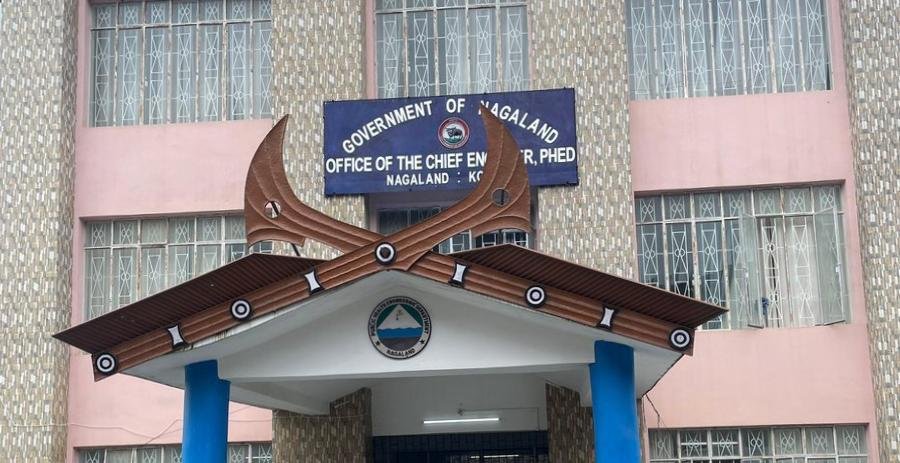In response to the NTPRADAO allegations which was published in various local news platforms on October 20 and 25, the Chief Engineer of the Public Health Engineering Department (PHED) Nagaland has made several clarifications.
The Jal Jeevan Mission (JJM) was launched in 2019, to ensure every Rural household access to Functional Household Tap Connection (FTC) by 2024. In Nagaland, the Department stated that the implementation of JJM faces unique challenges due to the State’s geographical and logistical constraints. “Inspite of this Nagaland has achieved 92.29% coverage of FHTCs, as on date. It is important to note that JJM implementation is still ongoing,” stated the Department.
As per the JJM operational guidelines, the planning, implementation management, and operation and maintainence of the project will be done by the village community. “The Detailed Project Report (DPR) for each village habitation are prepared only after the Village Action Plan (VAP) is finalized. These DPRs are then consolidated and approved by the Ministry of Jal Shakti, Department of Drinking Water und Sanitation (DDWS) through approved Annual Action Plan (AAP) which secures the necessary funding and resource allocation. Оnce approved, work orders are issued to the Village Water and Sanitation Committees (WATSAN) or contractors who are authorized by the concerned village councils, ensuring community partnership and ownership for sustainability,” stated the PHED.
The Department also clarified that all payments under the Jal Jeevan Mission are processed entirely through the Public Financial Management System (PFMS), and fund releases are made only after certification by the Third Party Inspection Agency (TPIA) which functions ander the District Water and Sanitation Mission (WSM) headed by respective Deputy Commissioner of the Districts.
“Contrary to the newspaper rероrts, claiming 1712.03 crores, the correct figures are ₹1282,711 crores received as the central Share and 143. 7043 crores as the State Share, totalling Rs. 1426. 4557 crores received since 2019-20,” claimed the Department.
Download Nagaland Tribune app on Google Play

According to the PHED, water supply to rural villages and habitations are implemented by two Departments viz Public Health Engineering Department (PHED) and Jal Jeevan Mission (JJM) and Rural Development Department (RDD) under the 15th Finance Commission tied grant award. All Funds under 15FC Tied Grant award are received and utilized by the RD Department. Out of 1348 villages/habitation, the Rural Development Department is responsible for implementation of water supply in 116 villages, out of which Old Riphyim village mentioned in the newspaper is one of them, claimed the PHED.
“Many Jal Jeevan Mission are augmentation and retro fitting schemes incorporating water supply infrastructures such as tanks and pipelines from previous National Rural Drinking Water Program (NRDWP) projects. Therefore in some villages and habitations, the existing structures like pipelines and reservoirs are being augmented and retrofited, while in remaining other villages/habitations, new water supply infrastructures are installed/built,” informed the clarification.
It also notified that the JJM follows NPWD specification, with ISI-compliant pipes that undergo internal and external quality checks/tests. In this regard, community feedback plays a vital role in maintaining quality, and the Department assured that it is resolving genuine complaints, for which PHED has set up a Grievance cell.
“As stated, the materials supplied are thoroughly inspected and certified by an Inspection Board that to ensure compliance with both quantity and quality standards, and is externally tested by the Govt of India, National Test House (N) and payments for each project is made only after certification by Third Party Inspection Agency (TSA). Therefore the allegation of likely misappropriation of 70% of the funds allocated for piping infrastructure and mismanagement of remaining 30% of funds allocated for civil works untrue,” claimed the PHED.
With the JJM requiring community participation and the role of Water and Sanitation (WATSAN) Committee, the PHED asserted that ensuring the local management of water supply schemes is crucial for its maintenance. It claimed that various trainings and capacity building training programs are being imparted to Department official and village functionaries by Department officials as well as by Department engaged agencies like Northeast Initiative Development Agency (NEIDA), Pinnacle Skills, Zynorique Consultancy, Kuda Tech Skills Centre.
As far as water quality is concern, the Department assured that it ensures safe drinking water through periodic testing done in 1 (One) State Laboratory and 11 district Laboratories, which are National Accreditation Board for Testing and Calibration accredited laboratories. In addition, the Department also conducts water quality testing through Field Testing Kits for which trainings are being imparted at various levels including villages. Suitable corrective measures are also taken up if contamination is detected, and are reported to the Ministry.
“While various challenges persist, the Department and its implementing partners are addressing the NTPRADAO concerns which appeared in the newspapers are noted, and shortcomings if any will be appropriately addressed. The Department welcomes any constructive feedback for further improvement,” assured the PHED.

